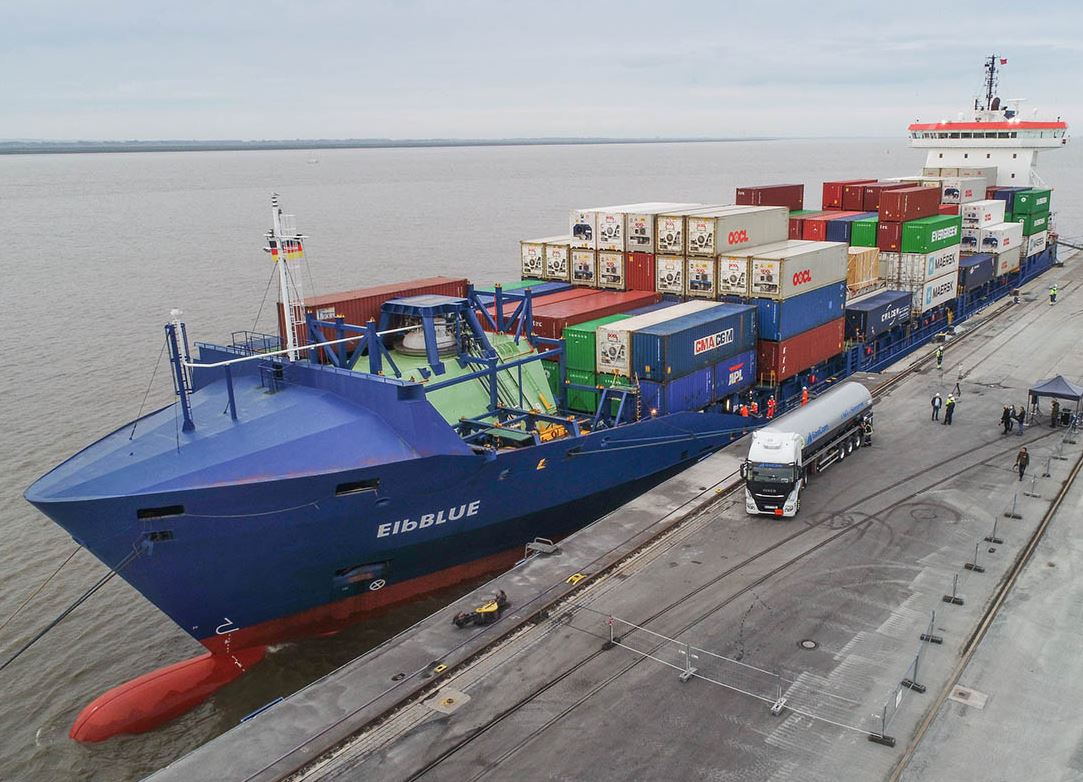Elbdeich Reederei’s 1,036-teu feeder container vessel, ElbBLUE, has significantly reduced emissions by operating on a blend of synthetic natural gas and LNG, according to Germany’s MAN Energy Solutions.
The vessels reduced its greenhouse gas (GHG) emissions by 27 percent compared to LNG alone and 34 percent compared with heavy fuel oil, MAN said in a statement on Wednesday.
DP World’s Unifeeder operates the LNG-powered vessel while MAN converted the ship back in 2017 to dual-fuel power.
In September last year, these two firms, Elbdeich Reederei, and other partners joined forces and completed what they said was the world’s first bunkering of a ship with synthetic LNG in Germany.
Kiwi’s power-to-gas facility in Werlte, Germany produced the liquefied SNG, which is a synthetic form of LNG that is carbon-neutral and generated from 100 percent from renewable sources, such as wind energy, the partners previously said.
Concept proved
MAN said in the statement that the new emission reduction data has emerged from measurements initially carried out on board the ship in September.
“With this project, we have proven the technical viability of our concept of the maritime energy transition. Today, more than ever, we are convinced that climate-neutral, synthetic fuels point the way to green shipping – and even further beyond,” Uwe Lauber, CEO of MAN, said.
“The current, global, political situation underscores the future role that synthetic fuels can play in a diversified energy supply in that they point the way toward less dependence on raw material deposits, suppliers and price fluctuations,” he said.
“As a result of the military attack on Ukraine in violation of international law, LNG prices, for example, have risen massively in recent weeks and are now at a similar level to SNG. If production capacity can be built up quickly and synthetic fuels made available to the market, SNG could become a climate-friendly and – in the long term – economical alternative to fossil fuels in shipping,” Lauber said.
Pure SNG to slash emissions by 80 percent
When operated exclusively on SNG, MAN expects a reduction of at least 80 percent in GHG emissions for modern ships, it said.
Gas operation also drastically reduces other polluting emissions compared to HFO.
In the case of the ElbBLUE, nitrogen oxide emissions (NOx) dropped by almost 87 percent, while emissions of sulphur oxides (SOx) decreased by about 99 percent.
The ship has achieved these values in both the exclusive operation on LNG and on a blend of LNG and SNG, MAN said.
MAN said the partners had carried out these measurements on a voyage between Germany’s Brunsbüttel, Germany and Dutch Rotterdam with SNG comprising approximately 50 percent of the bunkered gas at 85 percent engine load.
The ElbBLUE has a MAN 51/60DF four-stroke engine. As a multi-fuel engine, the unit allows operation with either HFO or LNG as fuel.
According to MAN, the ship’s test-run proved that SNG can replace LNG without engine modification.

